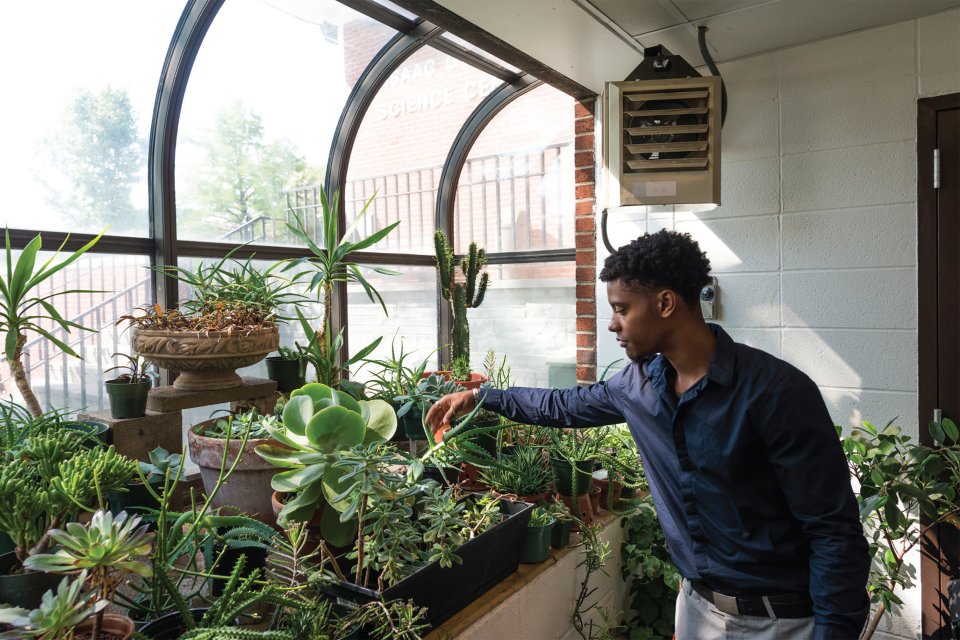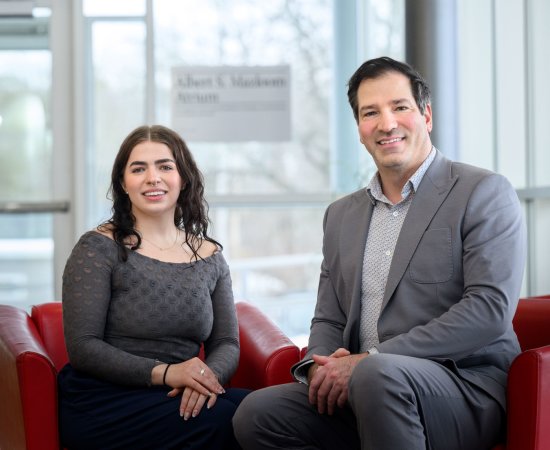
Biology major bringing new life to plants and Utica's greenhouse

Senior Marcus Recile can bring dead plants back to life—and has transformed Utica’s greenhouse from a forgotten teaching tool to a beloved and thriving campus landmark.
Marcus Recile loves plants. And he wants you to love them, too.
On a tour of Utica University’s greenhouse, the senior biology major sounds more like a salesman than the greenhouse manager.
“Now this is one of my favorites,” he says, pointing out a bright orange Bird of Paradise flower. “It adds a nice sense of color to the room, and it’s easy to take care of. I have one in my bathroom. The humidity from the shower is great for it.”
In the desert plant section, he explains that succulents are “forgiving. You can forget to water them for weeks, and they’ll be fine.” Overwatering, he notes, is a common amateur mistake. A handy trick: “Stick a popsicle stick into the soil about three inches down. If it comes up moist, don’t water it.”
He’s also known to wax poetic on these tours: “You can learn a lot about life from plants. Nothing ever dies, it just becomes something else.”
Clearly, Marcus Recile’s love for plants goes deep. As the greenhouse’s official caretaker since his freshman year and president of the Utica Growers’ Society, Recile has almost single handedly transformed the greenhouse outside Gordon Science Center from a sparse and underappreciated campus facility to a thriving oasis of green, calm, and life—not to mention its own formidable source of income.
Back to Basics
Marcus Recile first noticed the campus greenhouse before he was officially a Utica University student.
As a high-school senior on a tour during Accepted Students’ Day, “I thought, ‘Oh, they have a greenhouse! That’s awesome,’” he recalls.
Having studied hydroponics in high school, Recile, who’s from Waterbury, Connecticut, imagined that helping out in the greenhouse would make for a fun work-study gig. Only after arriving at Utica did he realize what condition the greenhouse was in after years of neglect.
The greenhouse’s previous driving force, biology professor Dave Moore, had retired in 2011, and in the years following, the greenhouse had been used primarily for biology department research. The few living plants were those species used for teaching.
“The greenhouse was limping along,” says biology professor Sara Scanga. “And it was not at all aesthetically pleasing.”
When he arrived at Utica that fall, Recile, who had indeed scored the work-study position, wanted to see it thrive again. He soon found himself in the greenhouse for hours each day, including weekends, and quickly identified a problem at the root: poor soil quality. Instead of using a synthetic fertilizer like Miracle Grow, as had been the common practice, Recile wanted to use natural compost—or more specifically, worm poop, to nourish the soil. He started a vermicomposting (the scientific term for “worm composting”) operation using food waste from the dining halls on campus and began to cultivate fertilizer rich in micronutrients that plants need.
He found cost-effective ways to grow new plants, too. He took note of the bright ornamentals that dotted campus in the spring, and at the end of the season, used clippings to clone them, producing more healthy flowers for free.

Back home in Connecticut for the summer after his freshman year, Recile worked at a large greenhouse. When he found out the owner planned to throw away several dozen succulents due to oversupply, he claimed them—and made the three-hour drive back to Utica with a car full of plants in tow. Today, most of the University’s desert plant collection comes from these Connecticut-born transplants.
Scanga, who is also Recile’s adviser, was impressed.
“Marcus really took us back to basics,” she said. “I gave him the independence to try his ideas, and he took the ball and ran with it, even further than I could have anticipated.”
A ‘Growing’ Business
The year before Recile’s arrival at Utica, Scanga had started the Asa Gray Growers Group (AGGG), an offshoot of the Asa Gray Biological Society, which has existed at Utica since 1972. Despite attracting a handful of members, the Growers’ Group lacked funding, and relied on modest bake sales to support their endeavors.
“We’d raise maybe 10 dollars each sale,” says Scanga. “It was really inefficient.”
Enter The Plant Whisperer.
Recile took on a leadership role in the group almost immediately, and proposed a new plan for fundraising: plant sales, selling extra plants in the greenhouse that would otherwise go to waste. Faculty, he knew, enjoyed keeping plants in their offices, and with the right marketing, students could get excited about plants, too.
With help from his roommates, he plastered campus with colorful signs advertising the first sale. He used his own oil paints to decorate the plain terracotta planters with funky abstract designs (painted pots add about seven bucks to the purchase price).
At the first sale, he handed customers his business card and sold plants with a promise: “If you have any questions or need someone to take care of your plant over break, call me.” He guarantees there will be no dead plants on his watch. And the Plant Whisperer means it: In a tale that’s taken on a mythic quality around the biology department, Professor Jessica Thomas once brought Recile a long-deceased snake plant she kept in her office.
“I left it in the botany lab with a note that said, ‘Marcus, sorry I failed you. Please reuse the pot.’” Weeks later, Recile returned the pot to Thomas—with a healthy, vibrant plant growing inside.
“I was speechless,” recalls Thomas. “And I continued to be amazed by his talent, resourcefulness, and creative ideas.”
“You can learn a lot about life from plants. Nothing ever dies, it just becomes something else.”
Since their inception, the biannual plant sales have been hugely profitable for the AGGG (which has since become the Utica Growers’ Society). Instead of selling only leftovers, the increase in demand requires Recile to grow the more popular plants, like peace lilies, coleus, and purple passion plants, specifically for the plant sales. Today, the group regularly brings in over 1,000 dollars per sale, all of which is reinvested into the greenhouse.
The Power of Produce
Recile doesn’t just believe in plants’ aesthetic value—he’s a vocal proponent of local, sustainable eating, as well.
His passion grew after a summer back in Connecticut, which Recile spent working as a counselor with the Connecticut Junior Republic, a non-profit near his hometown that helps at-risk youth prepare for employment through community service.
At first, Recile struggled to design activities that the kids, mostly 12-13-year-olds, were interested in.
“It was hard to get them to focus,” he says.
But he soon devised a plan that captured their attention. He taught them how to grow produce and herbs to use in their own meals. He teamed up with the program’s culinary staff, which began to use the homegrown lettuce in salads and garnish hot dishes with fresh herbs. The rest of the produce was sold to the local community.
“Most of the money we earned went back into the program, but the kids would each get to keep a small percentage,” he explains.
Soon, the students were eagerly growing arugula, basil, sage, rosemary and more. Recile created an Instagram account just for their group, where they’d showcase their harvest. The kids were finally excited about the work they were doing—and thrilled to add about $20 a week to the stipend they were already receiving from the program.
“It was cool to see them understand all the work that goes into growing a vegetable,” he says. With many of the students coming from urban areas, “some of them didn’t even know that a carrot grows underground.”
When he returned to Utica, Recile reasoned that the same program could be equally successful at the campus dining hall. He approached Sodexo’s General Manager Damian Boehlert, Executive Chef Art Langdon, and Sustainability Manager Deborah Hanson about growing fresh herbs to use in menu items.
“They were all for it,” he says, and in fall 2017, a dozen planters were installed in the terrace outside Strebel Dining Commons. Recile helps harvest the basil, rosemary, marjoram and other herbs every two weeks, which are then incorporated into Sodexo dishes.
“The response has been great,” he says. “It’s something the school needed.”
Seeds for Success
When he’s not talking in romantic terms about plant life, Recile is every inch the entrepreneur. Of the plant sales: “We’re reallocating our assets to create more revenue.” Students who buy plants aren’t customers, they’re “clients.” The greenhouse isn’t just a school facility, he says, but a functional business “and should be run like one,” which is part of why he took on a business minor during his sophomore year.
“I realized all my big ideas for the greenhouse can’t happen without money,” he says.
From his business courses, he’s developed the skills to put more structure in place. Now, the greenhouse is managed by Recile and a group of 10 students, members of the Utica Growers’ Society, divided into three departments: Production, Sales and Marketing, and Finance. The group isn’t limited to biology students either. Computer science, cybersecurity, and business students make up the current team.
It’s all part of Recile’s larger goal to build a legacy of students who will keep the greenhouse going (and growing) long after he graduates.
“I realized early on that I didn’t want someone else to have to live out my dream for this place,” he says.
Instead, he’s encouraged his successors to set their own goals for the greenhouse and create their own vision. Thanks to a crew of eager freshmen and sophomores, Recile, who plans to graduate in December 2018, feels hopeful.
Professor Sara Scanga, too, feels encouraged by the revived student interest in the greenhouse. The procedures and structure Recile has put in place, she says, have given the next generation of students some momentum.
But still, she’s realistic about the prospect of another Plant Whisperer emerging from a future crop of Utica undergrads.
“There will never be another Marcus,” she says. “He is irreplaceable.”
More Stories

The Ideal Co-Author
Grace VanEtten ’26 is handpicked by Professor Christopher A. Riddle to share authorship in prestigious bioethics journal

Utica University Opens New State-of-the-Art Cyber Range
Utica University faculty and students, along with dignitaries and industry partners, marked the opening of the University’s new state-of-the-art Cyber...

Women’s Sports Receive More Primetime Broadcast Olympic Coverage Than Men’s Sports For The Sixth Olympiad In A Row, Seventh Overall
Women’s sports received more coverage than men’s sports during NBC’s primetime television broadcast of the 2026 Milan Cortina Olympic Games,...
I would like to see logins and resources for:
For a general list of frequently used logins, you can also visit our logins page.
